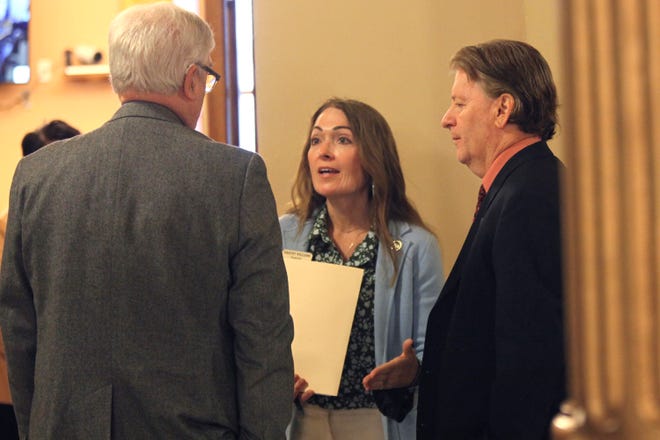
TOPEKA, Kan. — Kansas conservatives appeared likely Friday to push a proposed ban on transgender athletes in girls and women’s school sports through the Republican-controlled Legislature but weren’t generating enough support to overcome a possible veto by the state’s Democratic governor.
The House approved the bill late Thursday, 76-43. The Senate was expected to follow sometime Friday and send the measure to Gov. Laura Kelly.
The Democratic governor typically does not say what she’ll do with legislation before it reaches her desk, but she has dropped strong hints that she plans to veto such a ban. She’s a supporter of LGBTQ rights, and she’s called the bill “regressive” and suggested it would hurt the state’s efforts to recruit businesses — an argument critics echoed during the House’s debate.
Kansas is among more than 20 states that have considered such a ban this year, pushing back against an executive order from Democratic President Joe Biden aimed at preventing discrimination against transgender students. Idaho enacted such a ban last year, and Republican governors in Arkansas, Mississippi and Tennessee have signed measures into law this year.
“It’s about scoring points in the culture wars,” said Democratic state Rep. Boog Highberger, of Lawrence, home to the University of Kansas. “Instead of finding new ways to persecute people for being the way that God made them, why don’t we work on understanding — increasing our understanding and compassion instead.”
Supporters argued that they’re trying to preserve decades of hard-won opportunities for “biological” girls and women to compete in K-12 sports and win college athletic scholarships. They suggested that failing to enact such a ban represented discrimination against girls and women.
“I don’t mistreat any student. They have a right to live their life however they want,” said Republican state Sen. Renee Erickson, of Wichita, a former K-12 school principal and ex-college basketball point guard who is the measure’s primary sponsor. “But we also have to be fair to all of the students in that school setting. That’s what this bill does.”
With Idaho’s law on hold because of a federal lawsuit, the American Civil Liberties Union has promised to file a lawsuit if Kansas enacts a law.
But if Kelly vetoed the bill, conservatives would need two-thirds majorities in both chambers to override her action. They were eight votes short in the 125-member House, and LGBTQ-rights advocates also think the bill would be short in the 40-member Senate as well.
The threat of a lawsuit — and arguments that Kansas could lose collegiate sports tournaments or business development — irritated some conservative lawmakers.
Supporters of such bans have pointed repeatedly to the 15 championships won between 2017 and 2019 by two transgender high school runners in Connecticut, which prompted a federal lawsuit. They argue that “biological boys” have innate physical advantages in girls’ and women’s sports that would ruin competition.
“We cannot allow the business community to bully the women and girls in Kansas,” said state Rep. Barbara Wasinger, a western Kansas Republican.
Yet supporters generally have been unable to cite local examples of problems. The association overseeing extracurricular activities in Kansas K-12 schools says it has been notified of only five active transgender athletes, and there is no known case of a transgender athlete having won a Kansas championship.
State Rep. Jerry Stogsdill, a Kansas City-area Democrat, called the proposal “morally wrong,” but also argued that enacting the ban would be “shooting ourselves in the economic foot.” Rep. Brandon Woodard, another Kansas City-area Democrat and one of two openly gay lawmakers, said young people already leaving Kansas “in droves” over “backward policies.”
LGBTQ-rights advocates predicted that enacting the bill would increase bullying of transgender students.
Freshman Democratic Rep. Stephanie Byers, of Wichita, the state’s first transgender lawmaker, read from a note left by a harassed transgender Ohio girl who committed suicide in 2014, urging people “to fix society.”
“This is about someone who is different that you may not understand and your desire to prevent them from being a part of our society in all fullness,” she told her colleagues. “Trans girls are girls. Trans women are women.”








